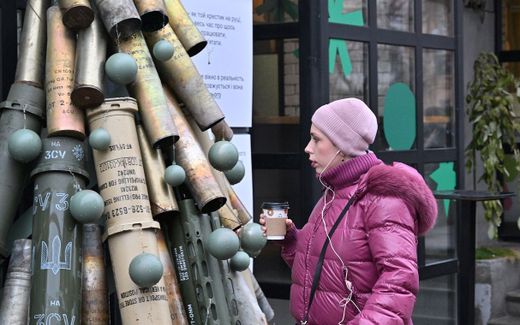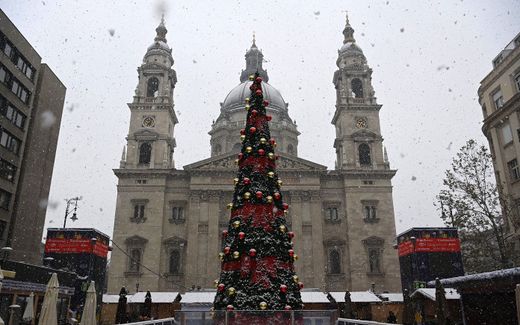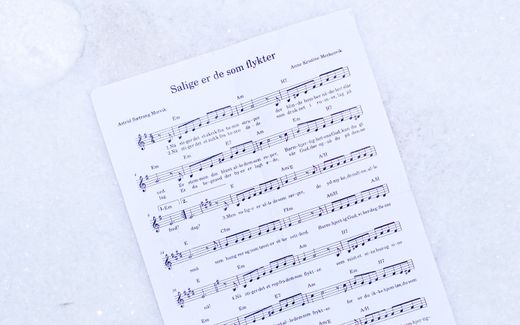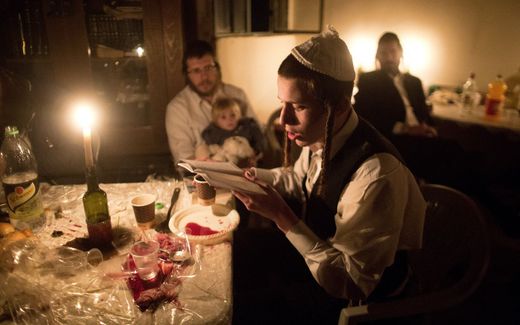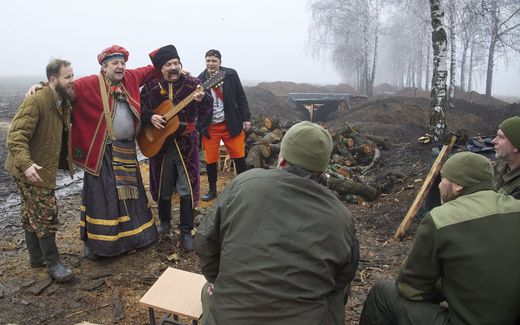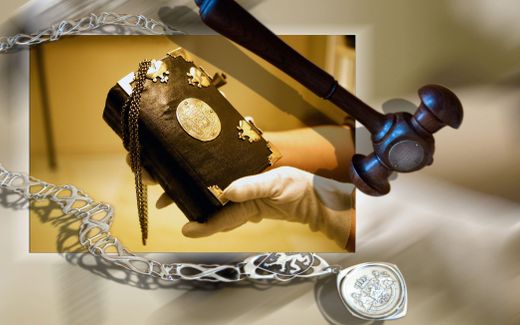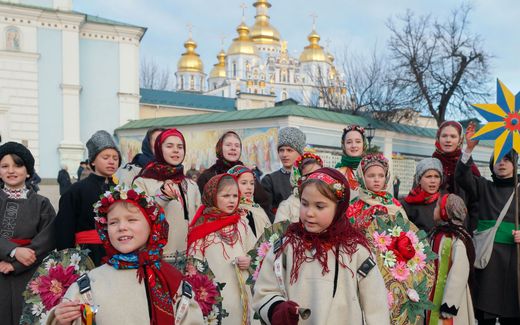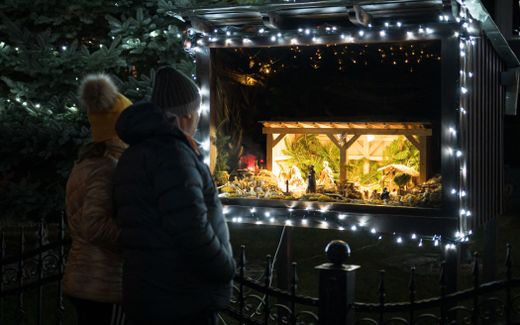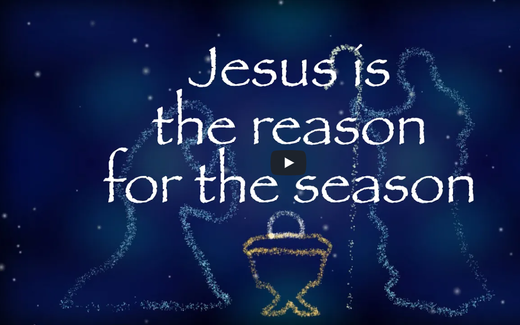Guest commentary from Palestine: Let churches play a role in reconciliation in both Gaza and Kyiv
23-12-2023
Opinion
Jack Nassar
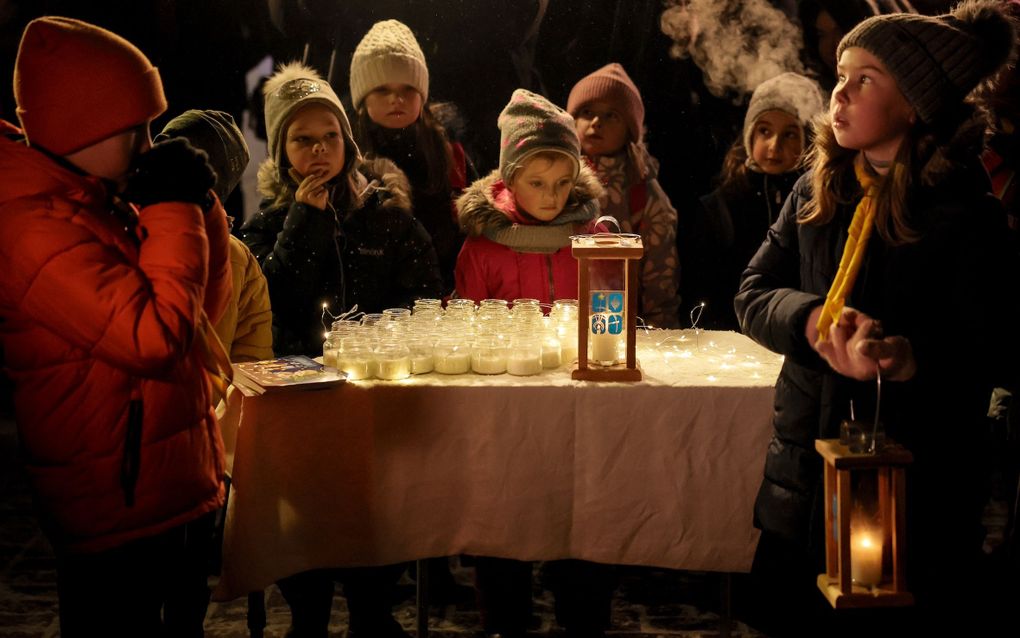
Ukrainian children of a scout organisation sing Christmas carols in a ceremony around the Peace Light of Bethlehem. At the moment, both Kyiv and Bethlehem are in a war. Photo EPA, Oleg Petrasyuk
Opinion
Celebrating Christmas and winter holidays could lead us to forget that there is no peace on earth yet. Conflicts are quite heavy, both in Ukraine and in Palestine-Israel. Jack Nassar, a Palestinian Christian, urges his European brothers and sisters to reflect on this reality from his Middle Eastern perspective.
Festive lights give the charming streets of European cities an enchanting glow this Christmas season. The reality in Gaza is the opposite. Gaza is veiled in the enduring shadows of war; the city grapples with relentless airstrikes and profound hardship, standing in stark contrast to the jubilant atmosphere across Europe.
This poignant dichotomy is a stark reminder of the influence of diverse theologies and media narratives in shaping our understanding of conflicts and the profound impact of international reporting on public opinion.

Let’s consider two cities: Gaza (in the Middle East) and Kyiv (in Eastern Europe). Exploring the contrasting Christmas scenes in Gaza and Kyiv, cities entangled in conflict, bombings, siege, and loss — Christians are confronted with a symphony of shared emotions. Passion, sorrow, grief, and a collective yearning for a more peaceful future bridge these seemingly distant worlds. In this context, the necessity of a continuous and empowered Christian presence in Gaza and throughout Palestine becomes not just a plea but an urgent call to action.
Testament
Gaza, a Palestinian strip of land cradled by the Mediterranean, has endured the weight of Israeli occupation since 1967 and faced a relentless siege since 2007. The strip grapples with ceaseless shelling, airstrikes, bombings, and sniper attacks — a tragic testament to the consequences of political conflicts. The stark contrast between Gaza and the festive scenes in European cities amplifies the gravity of ceaseless airstrikes, bombings, and an enduring siege, deviating poignantly from the typical joyful anticipation of Christmas.
Amidst the ruins of churches, schools, hospitals, institutions, and Christian homes —once adorned with Christmas lights and carols, in a Muslim-majority Gaza— darkness now prevails alongside the distant echoes of bombings. Families in Gaza huddle in makeshift shelters, clinging to hope inspired by the teachings of Jesus. The echoes of carols in the Gaza ruins intertwine with the melancholic wind in Kyiv, where families share the pain of loss and yearn for a peaceful celebration. These examples underscore the impact of war and conflict on the lives of individuals in Gaza and Kyiv, creating a vivid and relatable picture for readers.
Reflecting on the sad Christmases in Gaza and Kyiv urges us to examine the influence of media narratives critically and question the effectiveness of international interventions. Personal stories from individuals in these war-torn regions can bring the human experience to the forefront, transcending borders and binding us in a shared quest for peace.
European Christians are implored to bear the responsibility of scrutinising their own history, acknowledging the role their governments have played in contributing to global conflicts, apartheid, colonisation, ethnic cleansing, genocide, and racism worldwide. The resonance of past European conflicts is felt within their cities and countries. It echoes in places like Palestine and the entire Middle East.

Impact of war
During World War II, Dresden, Germany, bore the brunt of a relentless bombing campaign, which obliterated a significant part of its infrastructure and caused the tragic loss of countless lives. The bombing of Dresden remains an important and debated chapter in European history, highlighting the profound impact of war on civilian populations.
Warsaw, Poland, experienced similar devastation in the war, enduring intense bombings and the historic Warsaw Uprising in 1944. London, United Kingdom, faced sustained bombing campaigns that inflicted widespread destruction and claimed numerous lives. Yet, the resilience and determination of Londoners became a symbol of British strength in the face of adversity.
These cities, among many others in Europe, stand as poignant reminders of the devastating toll of war and the resilience of communities in the face of adversity. The scars left by these conflicts continue to shape their histories, serving as powerful reminders of the importance of peace and reconciliation.
Presently, European churches should hold a pivotal role in preventing and resolving conflicts worldwide.
Holy Land
The continued Christian presence in Gaza and throughout Palestine holds immense significance that should not be overlooked. For centuries, Christians have played an integral role in the fabric of Palestinian society, contributing to its cultural, political, educational, economic, and religious diversity, despite being a minority. Their presence is a testament to the enduring power of faith. Their unique heritage as descendants of the first Christians makes them the protectors and custodians of the holy sites and churches in Jerusalem, Bethlehem, Gaza, Nazareth, Galilee, and throughout the Holy Land.
Furthermore, I extend a heartfelt invitation to European Christians and Churches to embark on a transformative pilgrimage to the Jesus Land. This pilgrimage is not merely about visiting holy sites and churches but an opportunity to forge deep connections with Palestinian Christians. By establishing partnerships and twinning arrangements between European churches, seminaries, schools, universities, hospitals, and prayer groups with their Palestinian counterparts, our collective faith, witness, presence, and prayers gain even greater strength and impact.

Contemplating our individual roles in shaping a future characterised by peace, it becomes crucial to reflect on the significance of preserving cultural and religious diversity in conflict zones. By doing so, we contribute to creating a more vibrant and inclusive society in the aftermath of conflicts.
The resilience demonstrated by Gaza, Kyiv, and other cities is a powerful reminder of our shared humanity, compelling us to challenge the barriers perpetuating suffering and conflict. Our collective aspiration is to build a world where peace becomes the prevailing narrative.
Refugees
As we joyfully celebrate this festive season, we must pause and reflect on the sombre Christmases experienced in Gaza, Kyiv, and various European cities. These moments are poignant reminders of the universal longing for peace and a brighter future. Let us remember the refugees, the displaced, and all those living without necessities such as homes, electricity, water, food, medicines, internet, and mobile access. Their stories should inspire us to tirelessly work towards a world free from violence, hate, and injustice.
To achieve lasting peace, individuals, communities, churches, and nations must introspect, examine their histories, acknowledge their roles in conflicts, and actively pursue reconciliation. Civil society and religious institutions hold significant power in advocating for peace, supporting affected communities, and fostering empathy.
International interventions, media narratives, and government efforts should prioritise conflict resolution, addressing root causes, and providing humanitarian aid. This comprehensive approach builds a foundation for a peaceful and just world.

Relief and hope
The Biblical tale of Samson and Delilah finds an unexpected resonance in the tapestry of shared emotions that bind Gaza and Kyiv. Samson, a symbol of strength and resilience, faced trials and betrayals like the resilient Christian communities in Gaza and Kyiv.
Amid the ruins in Gaza, where the echoes of carols blend with the distant sounds of bombings, families find solace in the teachings of Jesus. This echoes the Biblical story where Samson, despite his adversities, drew strength from his faith.
Similarly, in Kyiv, where families share the pain of loss and yearn for a peaceful celebration amidst the melancholic winds, there lies a connection to the biblical narrative. The shared desire for brighter days mirrors Samson’s unwavering hope in facing challenges.
The contrasting Christmas experiences in Gaza and Kyiv are profound reminders of the universal language of grief and hope. Shared emotions connect people, transcending differences. It is incumbent upon individuals, communities, and nations to critically examine their roles in conflicts, promote reconciliation, and work towards a future where peace prevails.
By fostering empathy, understanding, and a steadfast commitment to justice, we can strive to create a world where everyone can celebrate Christmas in a spirit of peace, joy, and unity.
Jack Nassar (born 1985) lives in Ramallah, Palestine, holding a Master’s degree in political communications from Goldsmiths, University of London. Jack’s passion for fostering positive change is evident in his expertise, which extends to the public, private, non-profit and academic realms.
Related Articles

